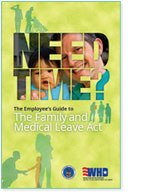Family and Medical Leave Act (FMLA)
The Family and Medical Leave Act (FMLA) is a federal law that gives eligible employees of covered employers the right to take unpaid, job-protected leave for specific family and medical reasons. While on FMLA leave, group health insurance coverage continues under the same terms and conditions as if the employee had not taken leave.
If you plan to take FMLA leave, keep in mind that FMLA requires employees to give notice to their employers within certain time periods, so get in touch with your employer right away.
- What does FMLA leave provide?
- What does FMLA leave protect?
- Who is a "covered employer"?
- Who is an "eligible employee"?
- What does 12 workweeks mean?
What does FMLA leave provide?
FMLA provides up to 12 workweeks of leave (in a 12-month period):
- to welcome a new child, including:
- the birth of a child and to bond with the child within one year of birth
- a new adoption or foster care placement and to bond with the child within one year of placement
- to care for a spouse, child, or parent with a serious health condition
- for a serious health condition that makes the employee unable to perform the essential functions of their job
- any qualifying exigency arising out of the fact that the employee’s spouse, son, daughter, or parent is a covered military member on “covered active duty”
FMLA provides up to 26 workweeks of leave (in a 12-month period) to care for a covered servicemember with a serious injury or illness if the eligible employee is the servicemember’s spouse, son, daughter, parent, or next of kin (military caregiver leave).
Employers can decide what a “12-month period” means for leave purposes in several different ways.
- The U.S. Wage and Hour Division has a fact sheet that describes options for determining the 12-month period.
Does my employer have to pay me for FMLA leave?
FMLA leave entitles workers to unpaid leave. If a worker has paid leave and the reason for FMLA falls under the employer's paid leave policy, the worker can use paid leave. An employer can also require a worker to use their paid leave when taking FMLA leave. If the worker is out of paid leave, however, the employer has to allow the worker to take unpaid leave.
What does FMLA leave protect?
Workers who use FMLA leave have the right to return to their job. Workers can’t be fired, punished, or discriminated against for taking FMLA leave. FMLA leave also protects a worker’s group health insurance coverage.
- More details on protections provided by FMLA leave are available at the U.S. Wage and Hour Fact Sheet “Employee Protections under the Family and Medical Leave Act.”
Who is a “covered employer”?
- Federal, state, and local government employers.
- Local educational agencies, including public school boards, public elementary and secondary schools, and private elementary and secondary schools.
- Private employers if they employ 50 or more employees in 20 or more work weeks in the current calendar year or previous calendar year.
Who is an “eligible employee”?
To be an “eligible employee,” a worker must:
- Work for a covered employer.
- Have worked for the employer for at least 12 months.
- The 12 months does not have to be 12 months in a row. Generally, only employment within the last seven years counts toward the 12-month condition, unless:
- The break in employment was because of an employee’s military obligations; or
- The break in employment is covered by a collective bargaining agreement or other written agreement.
- The 12 months does not have to be 12 months in a row. Generally, only employment within the last seven years counts toward the 12-month condition, unless:
- Have worked for 1,250 hours for the employer during the 12 months before the start of the leave.
- This hour total only counts hours actually worked. Both paid and unpaid leave do not count.
- Special hours of service rules apply to airline flight crew members.
- Work at a location where the employer has 50 or more employees within 75 miles.
What does 12 workweeks mean?
A worker’s actual workweek is what is used to figure out FMLA leave. So, if the worker would work 30 hours per week if they did not take any leave, a workweek is 30 hours; if a worker would work 50 hours per week if they did not take any leave, a workweek is 50 hours.
- The U.S. Wage and Hour Division provides more details on what counts as a workweek in their Fact Sheet “Counting Leave Use under the Family and Medical Leave Act.”
Where can I find more information on FMLA?
The Department of Labor has more information about FMLA leave on their website.



